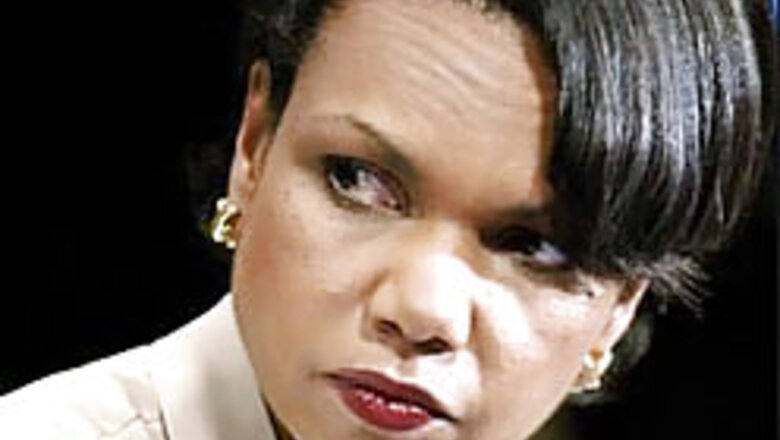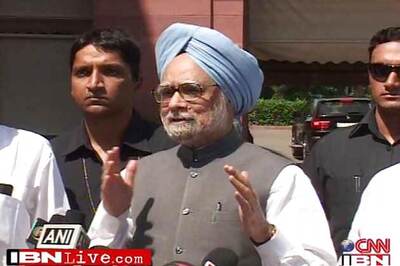
views
Washington: The nuclear deal with India is good and won’t trigger an arms race, US Secretary of State Condoleezza Rice told the US Congress on Wednesday ahead of American law-makers’ scrutiny of the agreement.
Rice, who was the sole witness before the Senate Foreign Relations Committee, said the nuclear deal won't lead to any arms race in the region. "India has never been a party to the Nuclear Non-Proliferation Treaty. And India is not going to become a member of NPT."
Rice, who was questioned by the leadership of House International Relations Committee - comprising 10 Republicans and eight Democrats - said India is making new obligations by bringing in International Atomic Energy Agency into its programme.
"The US-India civil nuclear deal is a strategic win. It's good for relations," she argued. She also pointed out that Great Britain, France, Russia & IAEA also support the deal.
"This civilian energy initiative will not only advance international security, but also increased energy security and increased business opportunities for America leading to more
direct and indirect jobs in this country."
"But all these advantages will have to be seen in the larger context of the elevation of India-United States relationship which is now a strategic partnership," Rice maintained appearing before the panel chaired by Republican Senator Richard Lugar.
"Continued isolation of our strategic partner is the wrong policy choice," she said in her presentation on the deal reached between Prime Minister Manmohan Singh and President George W Bush last July in Washington and further fine-tuned last month in New Delhi.
The top administration official came before the Senate panel to strongly endorse the legislation currently in Congress seeking changes to the 1954 Atomic Energy Act that will formalise the bilateral accord.
Rice also addressed critics, who say the plan President George W Bush agreed upon last month with India could dramatically increase India's nuclear arsenal. "Civil nuclear cooperation with India will not lead to an arms race in South Asia," she said.
Rice is also going to address the House of Representatives on the issue. Rice told the Congress that the deal, if implemented, will result in the creation of 10,000 new jobs in the US in the nuclear industry alone.
While the deal faces a tough fight in Congress, primarily because there is a perception in the Congress that President George W Bush has not been very forthcoming on the issue, the American CEOs' forum and Democratic leader Hillary Clinton have thrown their weights behind the deal in the fresh push for the Bush initiative.
Rice's deposition showed that there remains a strong commitment at the highest levels of the Bush administration to take the deal forward.
The Congress is taking a close look at an unprecedented Bush administration plan to share nuclear technology with India, with daylong testimony by Rice.
In her testimony, Rice strongly defended the deal President George W Bush reached last month with India.
The pact strengthens US ties with the world's largest democracy but also upends more than three decades of US law and policy. Rice's appearance came at a time of growing domestic disenchantment with US foreign policy.
PAGE_BREAK
Uncertainty over the military course of a rising China, unceasing turmoil in Iraq and stalemated Middle East and nuclear diplomacy over Iran and North Korea pose difficulties for Rice, even though her own performance continues to receive rave reviews in Congress.
Election season is dawning for members of Congress and for those who aspire to replace them. They all are aware of public discontent with the Bush administration's global record on several fronts.
The new US strategic partnership between Washington and New Delhi reverses restrictions on trade with states, such as India, that have not accepted comprehensive international safeguards over all their nuclear facilities.
The administration's response is that the deal will foster nonproliferation by conditioning India's purchase of foreign-made nuclear reactors on opening its civilian facilities to international inspections.
About that, the Congressional Research Service noted in a report last week that India would have the sole right to decide which reactors are civilian and which military.
The latter do not come under international supervision. Undersecretary of State Nicholas Burns, who played a pivotal role in negotiating the agreement, has offered assurances that "India can be trusted."
Democratic Sen Barbara Boxer, a member of the Senate Foreign Relations Committee, is critical of the agreement. "I do not share the view that closer US -India ties will be a counterweight to China, which seems to be the unstated yet driving force behind this deal," Boxer said in remarks prepared for delivery at the hearing.
This type of thinking is not only outdated and dangerous, it flies in the face of reality." Boxer said India's recent record indicates that it has no interest in being a hedge against China.
"It is naive to think otherwise," Boxer said. In advance of the hearings, Rep. Tom Lantos, also a Democrat but a supporter of the deal, said Rice's testimony would put the nuclear cooperation issue "front and center for the first time."
The House committee's senior Democrat, Lantos described as "jarring" the disclosure this week that two Iranian ships have visited ports in India.
The State Department said the visits do not suggest India was training or contributing to Iran's military capabilities.
(With agency inputs)



















Comments
0 comment